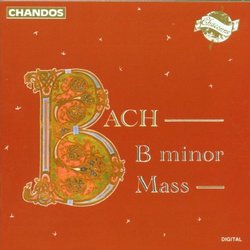| All Artists: Stephen Varcoe, Johann Sebastian Bach, Richard Hickox, Collegium Musicum 90, Nancy Argenta, Mark Tucker Title: Bach: Mass in B minor Members Wishing: 0 Total Copies: 1 Label: Chandos Release Date: 7/26/1994 Genre: Classical Styles: Opera & Classical Vocal, Historical Periods, Baroque (c.1600-1750), Symphonies Number of Discs: 2 SwapaCD Credits: 2 UPCs: 095115053324, 095115053324, 095115053324, 095115053324 |
Search - Stephen Varcoe, Johann Sebastian Bach, Richard Hickox :: Bach: Mass in B minor
 | Stephen Varcoe, Johann Sebastian Bach, Richard Hickox Bach: Mass in B minor Genre: Classical
![header=[] body=[This CD is available to be requested as disc only.]](/images/attributes/disc.png?v=a4e11020) ![header=[] body=[This CD is available to be requested with the disc and back insert.]](/images/attributes/disc_back.png?v=a4e11020) ![header=[] body=[This CD is available to be requested with the disc and front insert.]](/images/attributes/disc_front.png?v=a4e11020) ![header=[] body=[This CD is available to be requested with the disc, front and back inserts.]](/images/attributes/disc_front_back.png?v=a4e11020) |
Larger Image |
CD Details |
CD ReviewsA fine recording of a masterpiece eric edwards | Baltimore, MD (USA) | 12/21/1999 (4 out of 5 stars) "The B minor mass of Bach is, in my mind, the greatest choral work ever composed. Granted, maybe a couple of the arias are a bit dull, but overall, the piece is brilliant, filled with rich fugal textures, wonderful musical devices (listen to how Bach resolves the question of division/unison between God the Father and God the Son with a delightful tenor/soprano duet), and powerful emotion. In short, you MUST have a recording of the B Minor Mass. Now, with regard to recordings. DON'T make the mistake of buying a recording with a huge orchestra and chorus. Bach is not Handel, and the B Minor Mass is not the Messiah or Beethoven's 9th. It was designed to be played and sung by small ensembles. Otherwise, the intricacies of the piece get washed out. The second big decision is period instruments vs. modern instruments. I personally think the period instruments provide a nice color, as long as the musicians can play them properly. But modern instruments are OK, too. It's more of a personal preference than anything. This recording uses a small orchestra playing period instruments and a small vocal ensemble. The orchestra is quite competant, the conducting is clean, and the soloists are all superb. It is a new recording too, so it doesn't have the hiss that plagues older recordings. The chorus sometimes doesn't quite muster up enough bite, which is my only complaint. There are dozens of recordings of Bach's B Minor Mass out there, and while I can't say that this one is the best, it still is a good choice." Excellent balance kelsie | Plainview, Texas United States | 05/21/2008 (5 out of 5 stars) "Hickox's work is almost always a model of good conducting, musicianship, and balanced interpretation--his recording of the Mass in B minor is no exception.
The whole ensemble, voices and orchestra, render the piece with verve and liveliness. Hickox's tempi are usually swift, but not at the expense of the music's often complicated melodic lines (such as those fiendishly difficult melismas in the "Osanna"). The orchestra's playing in particular is breathtaking in moments, such as the horn player's stentorian "Quoniam" and the joyous exclamation at the beginning of the "Gloria." The vocal and orchestral forces are mid-sized, giving the music power where needed, but also that degree of intimacy many of the arias and more pathos-imbued movements demand (the "Et incarnatus est," for example). All four soloists rise to the occasion; the soprano (Nancy Argenta) sings the "Laudamus Te" with an audibly different accent--not a detriment, but a curiosity. Sound quality is wonderful: par for Hickox. This is a fine way to start and a good all-around performance for people looking for the balance between traditional and modern Bach interpretations." |

 Track Listings (12) - Disc #1
Track Listings (12) - Disc #1